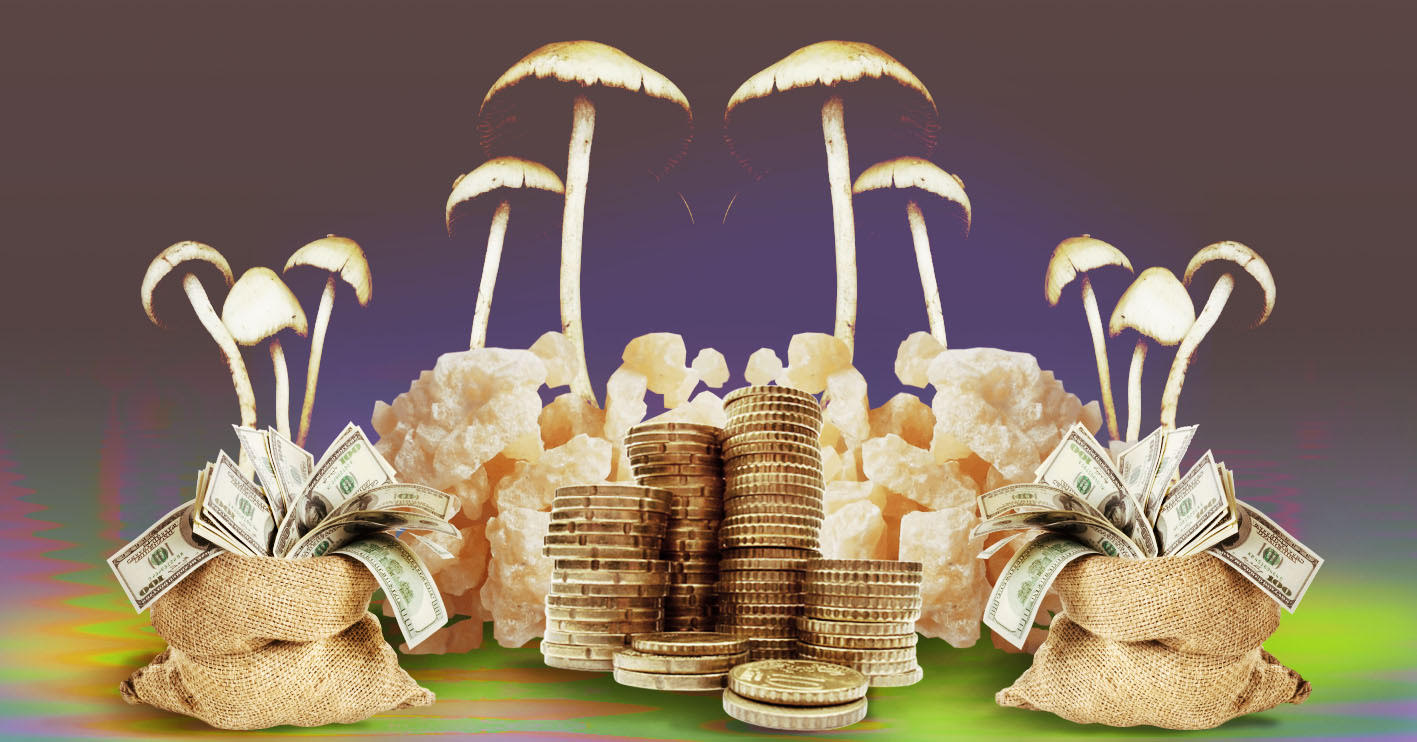- The Unbelievable Claims of Psymposia about MAPS and MDMA-Assisted Therapy - July 19, 2024
- Combining Psychedelics with Capitalism May Cause Unintended Side Effects - January 24, 2019
- It’s Time for the Psychedelic Renaissance to Join the Harm Reduction Movement - October 29, 2018
Some proponents of psychedelics are excited about their medicinal uses, some are excited about their potential to change culture, but most seem to be excited about both possibilities. However, for all the exciting research showing clinical benefits, it seems assumed that a better world will result as almost a side effect of the reemergence of psychedelics. I argue that this is naïve, and that social and environmental justice will never be a side effect of any other effort, but can only be achieved through sustained, intentional, and collective action.
As a newly graduated psychologist, this paper shook me, since I believed therapy could be a primary tool for social change and hadn’t considered the extent to which I functioned similarly to a combat doctor, patching up those wounded by unjust systems only to see them return to the battlefield
Community psychologist George Albee calculated that there are not enough therapists in the U.S. to even screen all children for mental health issues, let alone provide therapy to everyone who could benefit from it. He concluded that only revolutionary prevention, directed at dismantling systems that cause harm and stress, can protect our social and mental wellbeing. As a newly graduated psychologist, this paper shook me, since I believed therapy could be a primary tool for social change and hadn’t considered the extent to which I functioned similarly to a combat doctor, patching up those wounded by unjust systems only to see them return to the battlefield. As I delved into community psychology, activism, and critical theory, I learned that no system has ever been reformed by changing or replacing the individuals within it. The only way to address a problematic system is to end it. Systemic problems require systemic solutions.
Fortunately, two nonprofit organizations have long been leading the psychedelic clinical trials: Usona with psilocybin and MAPS with MDMA. But, as these organizations near the finish line with their research, corporate and venture capitalist interests are encroaching. Compass Pathways, a for-profit newcomer backed by Trump supporter and billionaire Peter Thiel, seems intent on beating Usona through the FDA approval process to monopolize not just psilocybin but psilocybin-assisted therapy. Compass has been accused of using tactics that are extreme even for the pharmaceutical industry, such as requiring researchers to sign nondisclosure agreements and claiming control and intellectual property rights over research findings and therapies that emerge from studies that use their psilocybin. Meanwhile, MAPS has decided to aid them in navigating the FDA process. ATAI Life Sciences, another Thiel initiative, is investing millions into additional research on psychedelics, longevity, and artificial intelligence.
Some psychedelic leaders have applauded these developments, revealing their lack of an adequate sociopolitical critique of capitalism or understanding of the systemic nature of injustice and oppression. We regularly hear that capitalism is the best or only “realistic” way to bring psychedelics to the masses. Yet, even a cursory comparison of socialist healthcare models versus for-profit healthcare models makes it obvious that only socialist models are capable of providing universal healthcare, based on need rather than ability to pay. Still, many seem convinced that capitalism is a necessary evil or that it can even be a Trojan horse to gain mainstream acceptance. These are dangerous assumptions.
The Problem of Capitalism
Black scholars have further demonstrated that racism is built into capitalism
While a nuanced critique of capitalism is beyond the scope of this article (see A Companion to Marx’s Capital), capitalism can be easily shown to be incapable of sustainability or fairness. In Capital in the 21st Century, Thomas Piketty showed mathematically, through hundreds of years of economic data, that capitalism inevitably leads to increasingly greater inequality because existing wealth (capital) will always grow faster than workers can grow their wages. The only exceptions are disruptions like war, depressions, and populist movements that temporarily redistribute wealth. Additionally, E. F. Shumacher (Small is Beautiful: Economics as if People Mattered) demonstrated in the 1970s that capitalism is unsustainable because it relies on ever greater consumption of natural resources, making the fatal logical fallacy of treating money (a social construct) like a scarce resource and nature like an infinite resource. Black scholars have further demonstrated that racism is built into capitalism. The white majority has been buffered from capitalism’s inequality and instability by relegating African Americans to the lower rungs of a racial caste system, while institutionalizing discrimination to assure they would remain there. Yet, late capitalism is no longer working well for most whites either, as they have increasingly become bound in debt as inequality rises.
This is Your Brain on Capitalism
Capitalism is spectacularly bad for social relations and for our physical and mental health. The World Health Organization identified the “maldistribution of power, money, and resources as main drivers of health inequities globally.” Inequality even appears to be counter to our social evolution, as mammals and birds reject unequal pay when trained to use a token economy (see video). Inequality isn’t even good for the rich. Various research experiments have shown wealthier children to be less generous in their altruism, and wealthier individuals to be more willing to cheat or lie to maintain their advantages. Not to mention the problems that arise from a small group of ultra-wealthy citizens with most of the political power living in kind of a parallel universe where they have no stake in (and therefore little understanding or advocacy for) things like public education, social security, welfare, or other public resources that they will never need.
We should acknowledge that people often discover psychedelics through their disillusionment with the outcomes of capitalism, though many don’t realize the roots of their dissatisfaction
We should acknowledge that people often discover psychedelics through their disillusionment with the outcomes of capitalism, though many don’t realize the roots of their dissatisfaction. When we’re content, we don’t consume as much and when we’re united, we seek equality, and so capitalism promotes dissatisfaction, materialism, overconsumption of the natural environment, egoism, competition, individualism, excessive productivity demands, instability of communities, inequality, alienation, and the resulting negative impacts on our social and mental wellbeing. These are not individual problems that can be overcome with personal choices or individual healing. “Personal” liberation is incomplete when it occurs outside the context of relationships, and is highly vulnerable to regression without sociopolitical changes that can support awakening. The feminist adage that “the personal is political” still applies.
The Myth of the Trojan Horse
Will psychedelics be reduced to an elite product that enhances status and feeds egos, as yoga and meditation have been found to do in some Western contexts?
Capitalism is an ideology with deceptively broad and pervasive values (such as private property/wealth, competition, inequality, consumption, wage labor, and individualism), which makes it capable of subsuming other ideologies and movements with more nuanced values. Rather than being a vehicle for psychedelics to be introduced to the mainstream, capitalism is likely to accommodate what is most profitable and suppress the aspects that are disruptive. Consider how Christianity, which is one of the most dominant ideologies the world has known, has been brought to its knees by those who thought they could merge it with capitalism for political gain. Today, devout Evangelic Christians overwhelmingly support a philandering, sexually abusive billionaire president despite morally abhorrent policies. Yet, some hold the belief that psychedelics will inevitably overwhelm the hearts of capitalists, without considering what capitalism may do to psychedelics. Will psychedelics be restricted to only individualistic (and therefore apolitical) healing and productivity? Will psychedelics be reduced to an elite product that enhances status and feeds egos, as yoga and meditation have been found to do in some Western contexts? Will they become part of “elite perfectibility,” where those who can afford treatment enter an endless cycle of self-improvement? Will a psychedelic hierarchy be enshrined, where a small group of “experts” maintain strict control over their use?
The effects of psychedelics are profoundly impacted by “set” and “setting”; meaning, the intention and context in which they are used shapes their effects. Perhaps we’ve been misled by overstated interpretations of research showing that psychedelics increase the personality trait of “openness” (which correlates with liberalism and intellectual curiosity), or that they increase nature relatedness while decreasing authoritarian beliefs. In reality, there is a selection bias, as people who take psychedelics, even in clinical research settings, already tend to be open and liberal. In the openness study, participants were already in the 93rd percentile (top 7%) of openness before their psilocybin sessions, and they became slightly more open. In the latter study, reductions in authoritarianism were not statistically significant at a 7-12 month follow up, while nature relatedness remained significant, but had weakened.
We are right to be impressed that openness, authoritarianism, and nature relatedness were impacted at all, since they weren’t a focus of the studies. Though they were part of the context, as most psychedelic studies include nature imagery and fresh flowers in the room, guiding is non-directive and consent-based (not authoritarian), and openness is encouraged (e.g., “trust, let go, and be open”). It should not be surprising that most psychedelic studies find only small to medium increases in openness (measured by “effect size”), but large decreases in depression and anxiety, because there is much less explicit focus and preparation for impacting openness. But what would happen if the openness-supporting aspects of therapy were completely stripped away to make treatments more appealing to groups that don’t value openness? Or conversely, what might be possible if we intentionally place a greater emphasis on openness or other collectivistic intentions?
Clipping our Wings
We’re told by leaders in the field that discussions of the revolutionary potential of psychedelics are too threatening to those in power, and so we need to stick to discussing more palatable (and individualistic) medical uses. There are two false assumptions here: first, that revolutionaries meet opposition because their tactics are too confrontational, and second, that we can sneak justice into the world without much disruption. I argue that revolutionaries like Ida B. Wells and Martin Luther King were repeatedly threatened because they were effective, not because they were too aggressive, and that any serious attempt at systemic change will be met with significant opposition. It is our persistence in the face of opposition, rather than accommodating the mainstream, that is our only hope for change.
To those who believe capitalism is our only option, consider that capitalism is a human invention that, until recently, we lived without (as is true of things like nation states and incarceration). As anthropologist David Graeber points out, ideologies survive by constraining our imagination for alternatives, convincing us that the status quo is natural and inevitable, and telling us that revolution is impossible or insane. But this will be a radical century with or without the intentional ending of capitalism. Which approach is truly more radical? Intentionally and thoughtfully moving beyond capitalism or waiting for global environmental collapse (and the subsequent collapse of societies) to end it for us?
Many Possible Outcomes
What is the revolutionary potential of psychedelics? How are they different when used for collectivist intentions?
There are many questions to consider. What is the revolutionary potential of psychedelics? How are they different when used for collectivist intentions? Can they help us to overcome our prejudices, dismantle systems of oppression, and recover from systemic traumas? Can they unite us and help us break through the illusion of the self-contained individual? Can they break our addictions to materialism and consumption? Can they help us to resist hierarchies, redistribute power, and democratize knowledge? Can they help us recapture our imaginations and develop sustainable ways of living? Any movement needs to work hard to act in ways consistent with its intended vision for the future (sometimes called “prefigurative politics”). The clock is ticking, and psychedelics may be our best tools to facilitate the social transformation (and personal adaptation to that transformation) so urgently needed to save our planet and create a just world. As for those who have been assuring the mainstream that there is nothing to fear from medicalized psychedelics, I’m afraid that if we follow their apolitical approach, we’ll find out that they’re right. The revolution will not be an unintended side effect.
Note:
This paper was presented at Cultural and Political Perspectives in Psychedelic Science, a symposium promoted by Chacruna and the East-West Psychology Program at the California Institute of Integral Studies (CIIS), San Francisco, August 18th and 19th, 2018.
Take a minute to browse our stock:
Did you enjoy reading this article?
Please support Chacruna's work by donating to us. We are an independent organization and we offer free education and advocacy for psychedelic plant medicines. We are a team of dedicated volunteers!
Can you help Chacruna advance cultural understanding around these substances?
















